6 Finance Tips For My Younger Self
It must be the money! Personal finances are one of those topics that many of us wish we learned more about in school. Budgeting, saving, investing, credit scores, student loan repayment – just thinking about these topics can provoke anxiety, even for the savviest finance gurus. It’s complex and it’s personal!
Because this issue can be a tricky one to navigate on your own, we’re dedicating this month to financial planning, with an emphasis on understanding how personal finances can help you accomplish your personal and professional goals.
Fortunately, our Alumni Career Advisers have learned how to manage their personal finances over the years and they’re sharing the tools and strategies they’ve used along the way. We asked them this question: What’s the best piece of financial advice you would offer to your younger self?
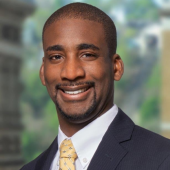 Given his role as a Certified Financial Planner™ in Personal Finance, Timothy Pope (’13) knows a thing or two about this important topic! “The best piece of financial advice I would offer to my younger self is to practice positive habits early, regardless of how small. Time compounds your decisions and your dollars. I would inform my younger self about tools such as the Roth IRA and encourage the use of it during my first jobs. Positive habits are powerful. If they’re in place early on, then when they meet strong earnings later in life the result will be exponential. In summary, I’d tell my younger self to be curious about personal finance, read, ask questions and do what you can with what you have today to develop positive habits.”
Given his role as a Certified Financial Planner™ in Personal Finance, Timothy Pope (’13) knows a thing or two about this important topic! “The best piece of financial advice I would offer to my younger self is to practice positive habits early, regardless of how small. Time compounds your decisions and your dollars. I would inform my younger self about tools such as the Roth IRA and encourage the use of it during my first jobs. Positive habits are powerful. If they’re in place early on, then when they meet strong earnings later in life the result will be exponential. In summary, I’d tell my younger self to be curious about personal finance, read, ask questions and do what you can with what you have today to develop positive habits.”
That same advice rings true for Cary Lambert (’13), who works in Strategy and Brand Management in esports, “The one piece of advice that I would give my younger self would be to start early in self-education around personal finance and investment. I know that I was presented with different self-learning resources while at Wake and early on in my career, but I was too invested either in my own individual projects or roles to take the time to sit in on these seminars and learning sessions. Time is crucial to investment and it’s never too early to learn!”
“The one piece of advice that I would give my younger self would be to start early in self-education around personal finance and investment. I know that I was presented with different self-learning resources while at Wake and early on in my career, but I was too invested either in my own individual projects or roles to take the time to sit in on these seminars and learning sessions. Time is crucial to investment and it’s never too early to learn!”
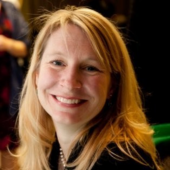 Similarly, Carrie Henderson (‘98), a Program + Project Manager in Environmental Science, recommended starting early and adding more with each pay increase. “Start putting money in your 401(k) the day you start work. At a minimum, put in the amount that maximizes the company match. Each time you get a raise, allocate a portion of that raise to increase the amount saved. It is substantially easier to manage saving when you start off without seeing the funds in your bank account.”
Similarly, Carrie Henderson (‘98), a Program + Project Manager in Environmental Science, recommended starting early and adding more with each pay increase. “Start putting money in your 401(k) the day you start work. At a minimum, put in the amount that maximizes the company match. Each time you get a raise, allocate a portion of that raise to increase the amount saved. It is substantially easier to manage saving when you start off without seeing the funds in your bank account.”
Carrie also recognizes additional value through the benefits your company may offer. “My company has a robust program as part of our total benefits package with lots of ways to maximize financial benefits. In addition to some of the expected things like flexible spending accounts and a stock purchase plan, we also have lots of opportunities for employee savings and discounts, including cars, gym memberships, tech items, restaurants, office supplies, personal rental cars, child care, etc. Check out all the things available on your company benefits site to help maximize savings – it is amazing some of the benefits that we get.”
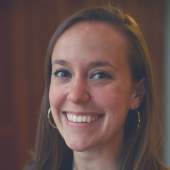
Checking out those employee benefits has worked well for Mo Earley (’13), a Policy Advisor for the Federal Government, too. “If your employer offers a 401k or other retirement benefit, put what money in that you can – ideally making sure you maximize your employer’s offer to match to a certain percentage! It can feel silly to set money aside for later so early into your career, but those extra years (and your employer’s free money!) really help what you have saved.”
Mo was creative with the use of credit cards: “be strategic (but careful!) with credit card points. One of the best things I did when I started working was open a credit card with the store that had the work clothes that fit me best. Their rewards program was really generous, and by using that card for most of my regular purchases, I earned coupons that helped a lot as I had to build a professional wardrobe – with pieces I am still wearing almost ten years later!”
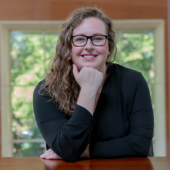 Even before you start your first job, Mallory Allred (’16, MS ’21), who works in Data Analysis in Higher Education, recommends cultivating a financial philosophy. “As you start looking for your first job, find a trusted person whose financial habits and professional life is one you would like to emulate. I’m sure for a lot of people, this person will be one of your parents. But if your parents come from a different professional background, you might have to work a little bit harder at finding someone you can speak to. This person could be a career coach or even a family friend. Navigating a first job offer and understanding benefits is complicated, and you shouldn’t feel like you have to figure it all out on your own!
Even before you start your first job, Mallory Allred (’16, MS ’21), who works in Data Analysis in Higher Education, recommends cultivating a financial philosophy. “As you start looking for your first job, find a trusted person whose financial habits and professional life is one you would like to emulate. I’m sure for a lot of people, this person will be one of your parents. But if your parents come from a different professional background, you might have to work a little bit harder at finding someone you can speak to. This person could be a career coach or even a family friend. Navigating a first job offer and understanding benefits is complicated, and you shouldn’t feel like you have to figure it all out on your own!
Safeguarding your financial future isn’t only about saving, though; for Jeffery Paul Hogg (’79), a Teacher and 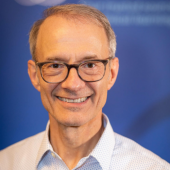 Radiologist at WVU School of Medicine, it’s equally important to, “Calibrate your style of living to meet your needs, not to what you think are the perceptions of those around you. Meeting your own needs is important, what others may think of your budget choices is not. Pay yourself first with an intentional savings plan because every unspent dollar you put away now is the luxury of a choice you can make later. You do not have to spend that dollar now just because it is in your hand.”
Radiologist at WVU School of Medicine, it’s equally important to, “Calibrate your style of living to meet your needs, not to what you think are the perceptions of those around you. Meeting your own needs is important, what others may think of your budget choices is not. Pay yourself first with an intentional savings plan because every unspent dollar you put away now is the luxury of a choice you can make later. You do not have to spend that dollar now just because it is in your hand.”
